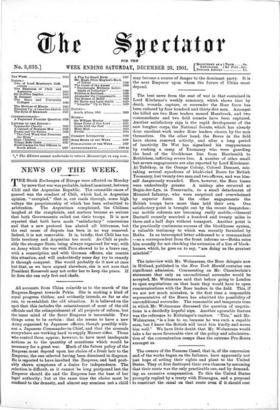The best news from the seat of war is that
contained in Lord Kitchener's weekly summary, which shows that by death, wounds, capture, or surrender the Boer force has been reduced by four hundred and thirty-five men. Amongst the killed are two Boer leaders named Haasbroek, and two commandants and two field cornets have been captured. Another satisfactory sign is the rapid development of the new burgher corps, the National Scouts, which has already done excellent work under Boer leaders chosen by the men themselves. On the other hand, the Boers in the field have shown renewed activity, and after a long period of inactivity De Wet has signalised his reappearance by rushing a camp of Yeomanry who were guarding the head of the blockhouse line from Harrismith to Bethlehem, inflicting severe loss. A number of other small but severe engagements are also reported by Lord Kitchener. At Tafelkop, in the Orange Colony, Colonel Damant, mis- taking several squadrons of khaki-clad Boers for British Yeomanry, lost twenty-two men and two officers, and was him- self dangerously wounded. Here, however, the Boer losses were undoubtedly greater. A mishap also occurred at Begin-der-Lyn, in Transvaalia, to a small detachment of Mounted Infantry, who were surprised and overwhelmed by superior force. In the other engagements the
British troops have more than held their own. One satisfactory point is brought out by the recent despatches : our mobile columns are becoming really mobile,—General Dartnell recently marched a hundred and twenty miles in three and a half days without transport. Another point is the practically continuous success of the blockhouse system, a valuable testimony to which was recently furnished by Botha. In an intercepted letter addressed to a commandant —so a correspondent from the front informs us—Botha rates him soundly for not checking the extension of a line of block- houses, which, he goes on to say, "are doing us the greatest mischief."


































